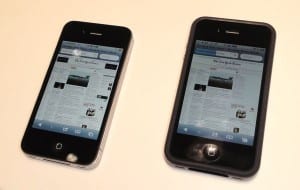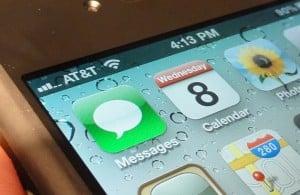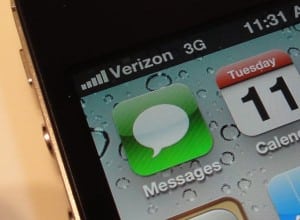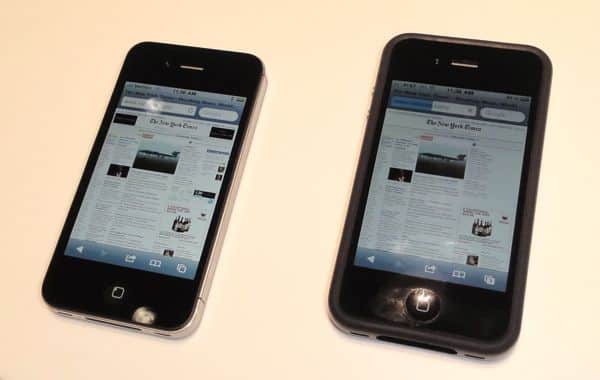
Hi Derek! Great question. While the actual iPhone 4 handset costs exactly as much on Verizon Wireless as it does on AT&T, there are a few key pricing differences in terms of 3G data plans, not to mention how the iPhone’s new personal Wi-Fi hostpot feature (which lets you share the iPhone 4’s 3G data connection with nearby, Wi-Fi-enabled laptops, tablets, and other mobile gear) works.
And beyond the details of the various service offerings, there’s that other looming question: Does the iPhone drop fewer calls on Verizon than it does on AT&T?
Price
So, as I just mentioned, new iPhone 4 hardware costs exactly the same on AT&T as it does on Verizon: $199 for the 16GB model, or $299 for the 32GB version, so long as you sign a two-year contract.
Meanwhile, there are also some good deals to be had if you’re comfortable ordering a used (or “certified pre-owned,” as the carriers like to say) iPhone. For example, you can currently get a not-quite-new 32GB iPhone 4 from Verizon for $249, while AT&T has a used 16GB iPhone 4 for just $99.
Data plans
Verizon still offers an unlimited 3G data plan for $30 a month, although there’s chatter that the carrier will soon ditch unlimited data in favor of a metered plan.
AT&T, on the other hand, started metering its data plans last year. Options include the DataPro 2GB plan for $25 a month (good for those who plan on streaming video and music over 3G), and the budget DataPro 200MB plan for $15/month (for those who are fine with light email and web browsing).
If you go over your monthly limit, DataPro 2GB subscribers should expect to pay $10 for an additional 1GB, while those on the 200MB plan will pay $15 for another 200MB bucket of data.

To use the Verizon iPhone 4 as a personal hotspot, you’ll have to pay $20 extra a month (for a total of $50/month once you add in the standard $30 unlimited data plan) for the carrier’s “3G Mobile Hotspot and Broadband Connect” add-on, which lets you share your iPhone’s 3G data with up to five other Wi-Fi devices at once.
Nice, but Verizon’s mobile hotspot plan comes with a data limit: just 2GB a month, meaning you should think twice about streaming long Netflix movies on your iPhone-connected laptop.
AT&T is a little stingier when it comes to the number of Wi-Fi devices you can connect to your personal iPhone hotspot: just three at once, compared to five for Verizon subscribers. That said, AT&T’s personal hotspot plan is a bit more generous: 4GB a month, which is shared between hotspot and regular iPhone data use. Also, AT&T’s DataPro 4G plan costs just $45, or $5 cheaper than you’ll pay for Verizon’s personal hotspot bundle.
Performance and voice quality
So, we’ve covered hardware costs, data, and personal hotspot features, but let’s get down to brass tacks—what about dropped calls?
Wireless call quality is notoriously tricky to test; after all, your performance will vary wildly depending on factors ranging from your location to the weather.
And while AT&T was slammed early and often for too many dropped calls and spotty data connections, it’s worth noting that the beleaguered carrier has been furiously building new cell towers and boosting its wireless capacity. (Indeed, the signal in my once AT&T-free Brooklyn apartment has grown noticeably stronger in the past several months, to the point where I can actually hold a complete conversation on my iPhone without getting the hated “Call Failed” message.)
In general, I recommend testing call quality yourself, in your own living room. Invite some friends who subscribe to different carriers (or just AT&T and Verizon, in this case) and have a reception duel in your den, kitchen, or wherever you most like to make calls in your home.

The results: Verizon Wireless earned top marks almost every in the U.S., including in the West, Southeast, Southwest, and Northeast (take note, New Yorkers). Verizon tied with AT&T for first place in the Mid-Atlantic region of the country, and took second place in the North Central states.
As for AT&T, well … it tied with Verizon for top honors in the Mid-Atlantic region, as I just mentioned. Elsewhere, however, AT&T’s performance was mid-range to poor, with the carrier getting only two stars out of a possible five in the West, North Central, and Northeast regions.
Before we hand the iPhone call-quality crown to Verizon, though, consider this: only AT&T allows you to use cellular data and make phone calls at the same time. On Verizon, your web surfing will come to a grinding halt if you take a phone call—unless you happen to be connected to a Wi-Fi network, that is.
And the winner is…well, it depends
So, which should it be: AT&T or Verizon?
First, Derek, do a little testing at your own place and see which carrier performs the best. Next, ask yourself: how much data do you really use? If you think you might use less than 2GB a month (check your phone bill to see how much monthly data you’ve been using), you might be better off with AT&T’s cheaper $25/month 3G plan; if you use more, consider Verizon’s $30 unlimited option.
Next, would you ever use your iPhone as a wireless hotspot? If the answer’s yes and you want the cheapest option, go with AT&T; if you want to flexibility of sharing 3G with up to 5 nearby Wi-Fi gadgets, Verizon might be your best bet.
Last but not least, do you like being able to surf and talk at the same time? If so, think AT&T; if not, Verizon’s looking good.
Hope that helps—and if you still have questions, just let me know.

